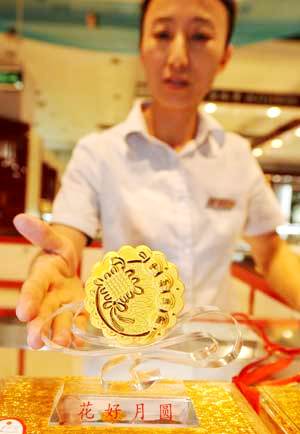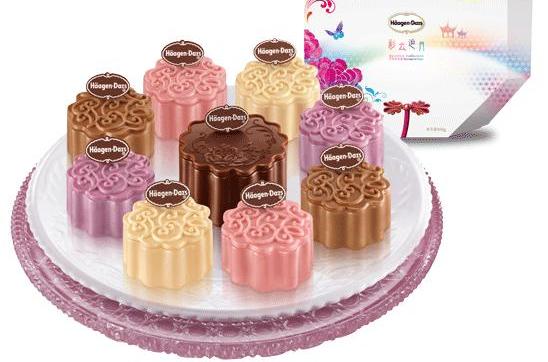|
Moonlight Madness

|
| Chang'e, the Chinese goddess of the Moon |
Today, on the 15th day of this year's 8th lunar month, the moon will
be at its roundest and brightest. The day, known as Mid-Autumn or Moon Festival, has been on the festival calendar in
China for at least 3,000 years, from the time of the Western Zhou dynasty. Legend has it that if tonight you offer round
pastries ("mooncakes") to Chang'e, the goddess of the moon, then she will bless you with her beauty.
These days, instead of seeking favour from Chang'e, mooncake-gifters focus on pleasing family, friends,
employees and clients. Last year, these eager recipients munched their way through 280,000 tons of mooncakes, which
cost 16 billion yuan (compared with 250,000 tons costing 15 billion yuan in 2011), according to Zhu Nianlin, president of
the China Association of [the] Bakery & Confectionary Industry [reported in the Global Times]. Those worried about their tummy-lines can still taste the festive spirit by playing the online
game that uses mooncakes as travel tokens, which pay for a quest to find out the secret of why Chang'e decided to leave
her palace on the bright side of the Moon. Even Angry Birds, the globally-popular online game owned by
the Finland-based company Rovio, is getting into the Chinese festive-mood by hatching a version of its game populated
with mooncake-shaped angry birds. Back in the real world,
Haagen-Daz ice-cream mooncakes [photo at the bottom of this article] have become highly sought-after. Gifters'
storage problems have been overcome by the company's use of a coupon system, which has made them a very easy-to-handle
gift for employers to present to their staff during the run-up to the festival. The coupons are generally well-appreciated,
even though the recipient has to visit one of the designated redemption points, and join a queue to collect their prize. Where there's a queue in China, there's also a chance that there will
be a tout about. A tout outside of Haagen-Daz was reported by the Global Times as offering to buy a 238 yuan
coupon for 60 per cent of the face value. The Global Times also reported yesterday that a department store in Xuanwumen,
in Beijing, was selling "mooncakes" at a somewhat higher price. How about two for 42,900 yuan (US$6,821)?
These "mooncakes" are made of solid gold and, according to a sales assistant in the store, "Most of the buyers
are... companies... who have bought gold mooncakes as a gift."

|
| Gold mooncake... Increasingly hard to swallow |
A whiff of corruption is sure to get the microblog sites abuzz with comments. This
and other stories about gold mooncakes selling like hot cakes have been burning across the Web in the
past 24 hours. This morning, my sweep of Sina Weibo (China's most popular Twitter-like site) using the characters jin
yuebing [gold mooncakes] unearthed some comments that illustrate the strength of the public's anger at the level
of corruption: Mr Li, under the headline, "High
price mooncake prostitutes Chang'e," writes about a department store with only 2 of its stock of 40,000
yuan mooncakes left, having quickly sold the vast majority to people buying the mooncakes as a gift for people
and organisations that can help their businesses. Mr Li pleads, "We need to find the necessary means to stop defiling
the purity of Chang'e". Someone who tweets under the
name Xiaosha [Little Stupid] is more direct. Xiaosha, in her headline, describes the practice of giving away gold
mooncakes as Zhenshi Fubai (Really Corrupt). She then re-tweets an article that appeared on the Sina microblog
of Zhongguo Qiyejia Zazhi [Chinese Entrepreneur Magazine], which sardonically quips that, on the week before the
holiday, the roads in Beijing are even more congested than usual because of the large number of gongzhirenyuan
[public officials] who drive to the city to baifang [pay a respectful visit to, which is a euphemism for giving
gifts to] their shangji [superiors]. Nothing enrages
Zhou Public more than news of those responsible for protecting their interests being found with their snouts in the trough
of corruption. Despite this being an issue that causes so much public angst, countless crack-downs on those abusing
their positions seem to have done little to have cleaned things up. The scale of the problem can only be guessed at, but some light was shone on this dark area last year, when
a Bank of China report was mistakenly (?) published on the Web. It was quickly removed, but not before a number
of news agencies had read it. The report stated that up-to 18,000 corrupt government officials and employees
of state-owned enterprises had escaped the country with more than 800 billion yuan (US$120B) worth of funds (between
the mid-90s and 2008). In one case (reported
by the WSJ), Xu Fangming, a former ministry of finance official, allegedly deposited 1 million yuan into the bank account
of his son who was studying abroad. The funding of sons studying abroad has recently created much excitement in the
Weibosphere (China's Twittersphere). The news that disgraced Chongqing
party secretary Bo Xilai and his wife Gu Kailai had managed to send their playboy son, Guagua (Melon), to Harrow public school,
has raised more than a few eyebrows. Gu Kailai
was recently sentenced to death for the murder of Neil Heywood; for which she received a suspended sentence [Ms
Gu was treated leniently because she was acting, she argued, to defend her son, whom Mr Heywood, an Old Harrovian, had
allegedly threatened]. In an earlier twist to
the sorry tale, Wang Lijun, Chongqing's former police-chief, and Mr Bo's long-time head-goon, who exposed the murder
(to the Americans during his flight to their consulate in Chengdu) was last week sentenced to 15 years for corruption, as
well as a litany of other charges. The nation's leaders have
been saying for several years now that corrupt cadres are the country's "worst enemy". The public
totally agrees. But, these days, the public expects something more than words, they want to see action. The
problem is that the Bo Xilai episode is a double-edged sword.
In summary, all of this is a long way from the steady-as-she-goes backdrop that was envisaged for the 18th party congress.
Which is of course when the next generation of China's leaders will take their place at the helm, in a reshuffle that happens
every ten years (or at least is supposed to happen every ten years). There is, to say the least, a degree of tension
in the air. When all's not well in the state of Denmark, then focus on what's happening further
afield. Back on home turf, it's also important
to make sure that all potential advantages are utilised. To which point, it's just been
announced that the congress will be held on 8th November. 8 is an auspicious number
in China and, when combined with the 11th month, and 18th occasion, it is a particularly fine omen as far as
numerologists are concerned (18 on the 118 as it were).
But, sadly, the timing of the 18th congress was a bad portent for my daughter's school show. The
local government (in a suburb of Beijing) were so worried that it was too close [several weeks away actually]
to the aforementioned much bigger show, they rejected the school's application for a performance licence. Consequently, the school had no choice but to cancel the planned show.
Which is a shame for the children and also for the parents, because it's great watching kids have their 2 minutes
of stardom (singing, dancing, or whatever takes their fancy).
And the name of the school's talent show that the authorities had felt so threatened by? Moonlight Madness, prophetically enough.

|
| Haagen-Daaz mooncakes, a far more palatable gifting idea |
|

